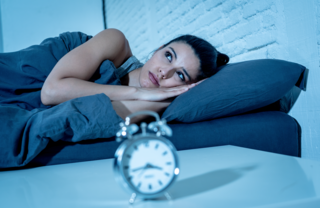Sleep
5 Reasons Chronic Pain Interferes With Sleep
And the changes that you can start to make now to improve it.
Posted March 27, 2020

Does chronic pain prevent you from getting good sleep? No—it does not.
Yet many (if not all) chronic pain sufferers believe that they must first rid themselves of their pain in order to sleep better. Unfortunately, this is a false belief. When it comes to getting quality sleep, identifying the roadblocks getting in the way of sleep is actually the first step.
The body is designed for sleep. Therefore, what we must do to facilitate it, is to get out of our own way. This paves the way to achieve sleep naturally. Although pain-sufferers can get trapped in a cycle of sleeping poorly (increasing their perception of pain and further disrupting their sleep), this cycle can indeed be broken.
Let’s assume that you are a pain-sufferer, only getting two hours of sleep per night. Your sleep problem did not start suddenly—it developed gradually over months, or even years. The same timetable occurs for recovering a healthy sleep pattern; as you begin to make changes in your habits you will see improvements in your sleep quality, but it takes time for this to happen.
Here are five habits known to negatively affect restful sleep for chronic pain-sufferers:
1. Eating at the wrong time of day.
Many chronic pain sufferers have fallen out of the pattern of getting up early in the morning; consequently, they do not eat breakfast, lunch, and dinner in the first 2/3 of the day. Yet our eating schedule sets our biological clock for many things, including our sleep cycle.
Eating your first meal of the day in the morning increases your metabolism. This in turn starts the digestive cycle; as a result, energy is made available to keep you alert and active during the day. A person who eats only in the evening or at night develops a biological clock that is off-balance. This can distort the sense of being awake, hungry, alert, and … sleepiness.
2. Taking medications and/or drugs that interfere with sleep.
Opioids—one of the more common medications used to treat chronic pain—interfere with the brain's ability to enter both REM and the deeper, restorative stages of sleep.
Those who use marijuana in the evening or throughout the day to manage pain develop less slow-wave sleep, worse sleep efficiency, and shorter periods of REM sleep than non-users. Alcohol has often been used as a sleep aid, but it too disrupts sleep. A well-known depressant, alcohol also decreases alertness and memory storage in the day following its consumption due to disrupted sleep patterns.
3. Moving less to reduce pain levels.
The pain cycle that interferes with quality sleep also serves as a trap for chronic pain patients. See if this scenario sounds familiar: a person begins to experience ongoing pain; as a result, they assume that moving less by not exercising, stretching, or walking will limit their pain.
However, moving less does not, in fact, limit pain. What it does do is lead to muscle and nervous system dysfunction, which then leads to muscle spasms and shooting pain. Shooting pain leads to guarding behavior, which results in even less movement. There’s no question that quality sleep requires a day full of activity, movement, and stress-reducing activities like exercise, walking, and stretching. The less you move, the more poorly you will sleep.
4. Becoming angry or anxious when you cannot sleep.
Not getting quality sleep impacts our emotional and physical health. It also impacts the quality of life we experience at work and at home. Most people understand the significance of good sleep, and therefore, put pressure on themselves to achieve it.
However counterproductive it is, this paradox—the pressure to sleep well—significantly interferes with our ability to sleep. The more we focus on trying to sleep, the more likely it is that sleep will elude us. Sleep is something that occurs on its own absent from our observation of whether it is happening. Counting how many hours we have slept or not slept, looking at the clock, or trying to get ourselves in the exact right position for sleep goes against this principle. In other words, the most restful sleep sneaks up on us when we are not anxiously anticipating it.
5. Disordered late-night problem-solving sessions.
When you lay down in bed and close your eyes at the end of the day, you instantly turn on your “mental radio station.” Your mind starts to review the news of the day—particularly the most worrisome or bad news.
At night, our brain works to make predictions about the difficult things we will face tomorrow. Throw in a few reminders of your past life failures, some guilt, a broken relationship or two and you have a nice recipe for a busy, upset mind.
This state of mind is sure to keep you up for a few hours while your brain attempts to work through these situations. The problem with this is that you are too tired to put two coherent thoughts together, let alone problem-solve. This effectively renders your problem-solving session inefficient at best, and detrimental to sleep, at worst.
How to Change Your Habits
Sleeping well requires hard work and dedication to replace old and dysfunctional habits with new and effective ones. Passive solutions to poor sleep—such as medications, marijuana, alcohol, or melatonin—only create long-term problems that are not worth the “quick-fix” relief they appear to provide.
To really sleep better—start your day early in the morning. Eat breakfast, lunch, and dinner at normal times of the day. Make it a habit to go to bed and get up at the same time each and every day. Regardless of how you slept the night before, avoid napping. Steer clear of passive solutions to control pain and sleep management (drugs, medications, and alcohol).
Just because something hurts when you move, it does not necessarily mean you are harming yourself. Learn to embrace the thought that “pain does not equal harm;” this will help you to get moving throughout the day. Remind yourself that even gentle movement brings oxygen, blood, lubrication, strength, and increased stability to your body. In short: activity improves sleep.
Practice accepting all that happens in your life—even your sleeplessness. If you are awake, accept being awake. Make room for sleeplessness in your life and do not view its occurrence as an enemy force. Instead, be willing to experience sleeplessness in the spirit of curiosity by noticing all that you can about your experience. Mindful acceptance will help you manage your frustration and anxiety.
We are all under pressure, every day of our lives. We have health, money, relationship, work, and world problems that impact us. It helps to not isolate yourself with your problems; by doing this, you effectively convince yourself that you are unique in your struggles, and thus, beyond help. To combat the “woe-is-me” tendency that we all have, talk about your problems with others. Join a support group, form a support group, talk with a friend on the phone, or pray. The more people you have in your life who are happy and good, the stronger you become. When we do not process our thoughts and feelings before we go to bed, our mind simply assumes everything needs to be sorted out now, which it does not.
The Next Step
If you would like to learn more about sleeping well, consider using principles of Cognitive Behavior Therapy for Insomnia to develop new habits for quality sleep. To learn more about how to specifically manage chronic pain and sleep, access the free resource The Sleep Solution for Chronic Pain.




